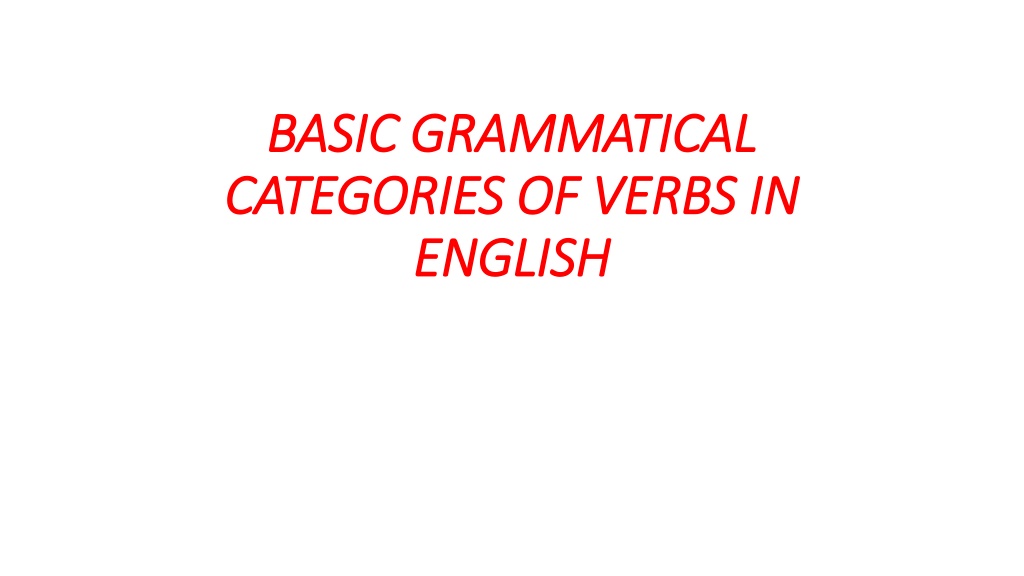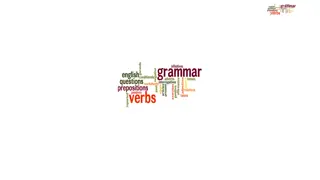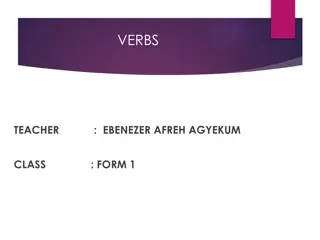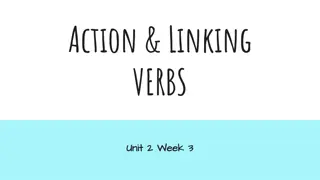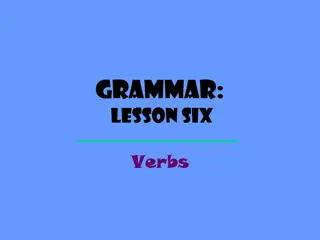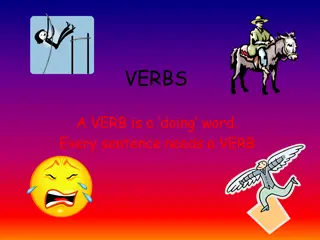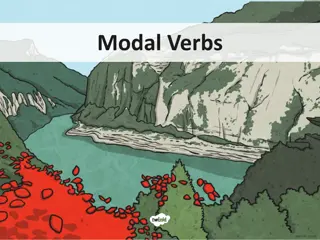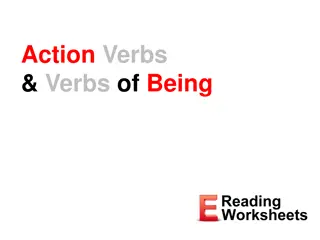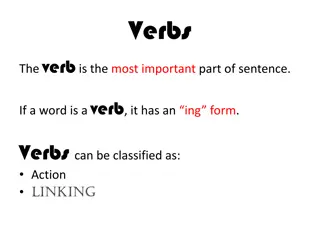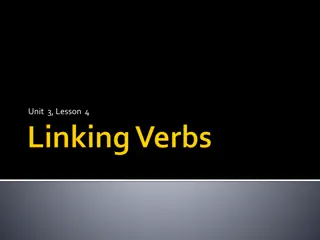Six Grammatical Categories of Verbs in English
Explore the six grammatical categories of verbs in English, including person, number, aspect, tense, mood, and voice. Learn how each category influences the structure and meaning of sentences with detailed examples.
Download Presentation

Please find below an Image/Link to download the presentation.
The content on the website is provided AS IS for your information and personal use only. It may not be sold, licensed, or shared on other websites without obtaining consent from the author.If you encounter any issues during the download, it is possible that the publisher has removed the file from their server.
You are allowed to download the files provided on this website for personal or commercial use, subject to the condition that they are used lawfully. All files are the property of their respective owners.
The content on the website is provided AS IS for your information and personal use only. It may not be sold, licensed, or shared on other websites without obtaining consent from the author.
E N D
Presentation Transcript
BASIC GRAMMATICAL BASIC GRAMMATICAL CATEGORIES OF VERBS IN CATEGORIES OF VERBS IN ENGLISH ENGLISH
How many grammatical categories of verbs How many grammatical categories of verbs are there? What are they? are there? What are they? There are SIX grammatical categories. They are: 1. person 2. Number 3. Aspect 4 . Tense 5. Mood 6. Voice .. ((( Meaning )))
1. Person : 1 1. Person : 1st stPerson , 2 3 3rd rdperson person Person , 2nd ndPerson , Person , 1stPerson : I , we : We are learning languages. I am studying English. 2ndPerson : they , you : They were watching TV all night. You have been driving fast today. 3rdPerson : he , she , it : He / She is sleeping deeply now. It drinks milk every morning.
2. Number : Singular & Plural 2. Number : Singular & Plural Singular : I, he, she, it .. Plural : We, they Note: (you) singular or Plural .. Context You are a student. (Sing.) You are students. (Plu.)
3. Aspect 3. Aspect: Progressive,Perfect,Progressive : Progressive,Perfect,Progressive Perfect and Simple Perfect and Simple He was playing tennis at present time. She has washed her dress this morning. They have been cleaning the house since morning. He gets up early every morning.
4. Tense : 4. Tense : Present Present & & Past Past She usually cleans her room . We clean our room every day. ( Tense: Present ) She cleaned her room two hours ago. ( Tense : Past )
5. Mood : 5. Mood : Indicative Indicative , , Imperative Subjunctive Subjunctive Imperative & & They are teaching English well. They are good drivers. Teach English well. Don t smoke a lot. If he runs fast, he gets out of his breath.
6. Voice : 6. Voice : Active Active & & Passive Passive Jack speaks two languages now. Jack spoke one language last year. Two languages are spoken by Jack. One language was spoken by Jack.
Examples Examples: What are the grammatical : What are the grammatical categories of the following sentences? categories of the following sentences? 1. Jack cooks dinner for us 3 times a week. ( 3rdperson , singular, present , simple , indicative , active , MEANING habit in the present ) 2. Yesterday we were cooking for hours on end. ( 1stperson, plural, past, progressive, indicative, active, MEANING .. Action in the past that continued over an extended period of time )
3. She would have cooked , if you had asked her to. ( but in reality you didn t ask so she didn t cook ) ( would have cooked: 3rdperson , singular, past, conditional , active ) MEANING: hypothetic outcome in the past, contrary to fact ) ( had asked: 2ndperson , singular, past, perfect, subjunctive, MEANING: hypothetic assumption in the past, contrary to fact )
4. I suggest that dinner be cooked no later than 2 pm. ( 3rdperson, singular, present, subjunctive, passive, MEANING : strong recommendation , which will not necessary be fulfilled ) THANK YOU FOR WATCHING
